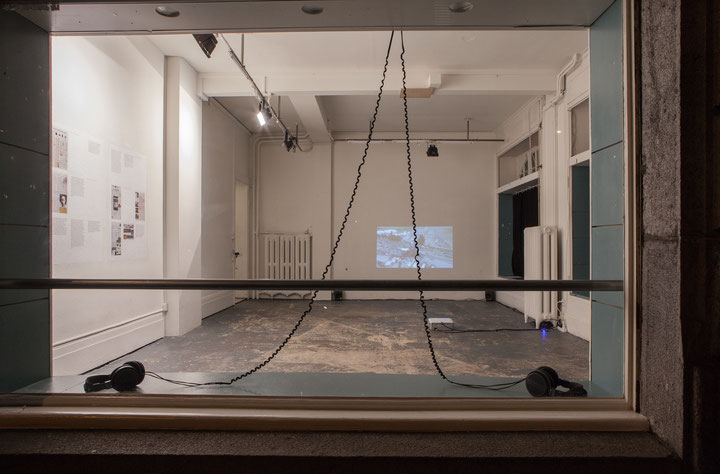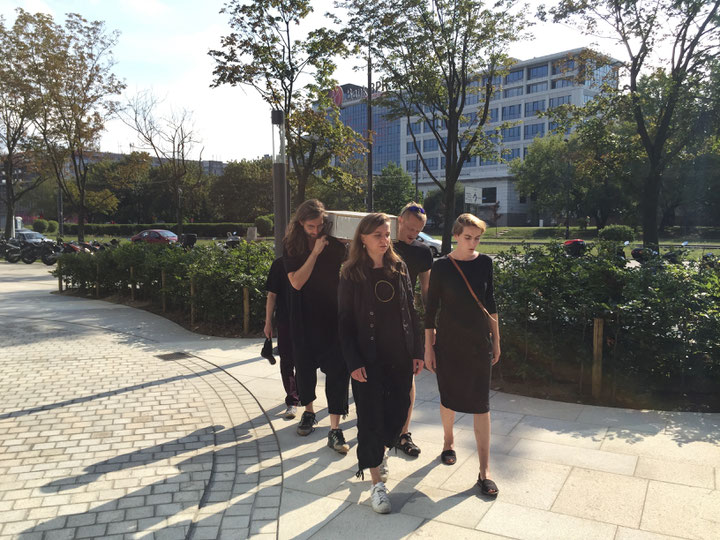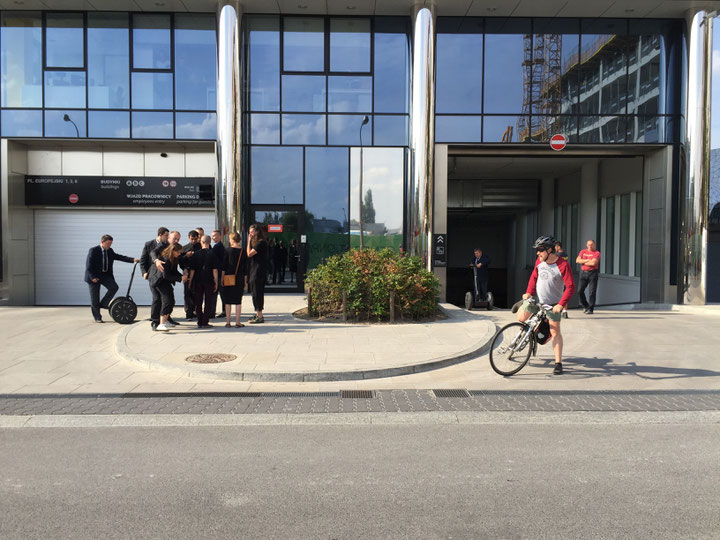Issue 4/2016 - Europe’s Other
53 wounds in solidarity
Appropriation and 'hostipitality' in the slogan 'we refugees'
Expressions of solidarity with refugees can conceal essentialism and condescension based on citizenship, class and religion. Governments' flagrant neglect of responsibilities entailed by use of the 'we' reveals the aporias of a solidarity founded in national belonging, argues Suzana Milevska.
Ever since Hannah Arendt’s essay ‘We Refugees’ (1943), the phrase has been used to express sympathy with the under-privileged, the precarious and the politically persecuted.1 Fifty years later, Giorgio Agamben borrowed it for the title of an essay comparing Nazi concentration camps and the contemporary detention centres.2 Today, in the context of the biggest refugee crisis in Europe since WWII, the phrase has become a slogan of solidarity with exiles. Particularly when used by those who are not refugees themselves, it is considered proof of compassion and empathy for people who, fleeing political turmoil in their home countries and regions, have been stripped of their basic human rights in their new domiciles.
Yet the slogan is ambiguous and open to charges of self-interest, condescension and even racism. On one hand, the ‘we’ can conceal suppressed fear of the refugee, of the ‘other’. It can express the Eurocentric concept of a divide between the ‘us’ and ‘them’, between the privileged European and the non-Europeans exiled in Europe, between western citizens and the legal immigrants from the former Yugoslavia and elsewhere in eastern Europe, between Christian and Moslem immigrants. There is a coveted exclusivity, essentialism and condescension in the ‘we’, based on citizenship and residence status, class, religion and other differences. Thus, there is an inner split within the ‘we’ itself, caused by its unspecified and heterogeneous alignment – as if the right to use the pronoun were allocated on a ‘first-come-first-served’ basis.
These aporias expose the slogan ‘we refugees’ to criticism. However, the question as to who it includes and how one gains the right to utter it is not only semantic. The origins of the distrust also need to be discussed.
Turning words into acts
English, unlike some non-European languages, has no exclusive form of the first person plural pronoun; in other word, no grammatical distinction is made between an all-inclusive ‘we’ and a ‘we’ that includes only some of the addressees. Despite this fact, or perhaps because of it, there are many possibilities for duplicity and hidden agendas in the use of ‘we’. It is therefore necessary to discuss the difference between ‘saying’ and ‘doing’ in the use of the first person plural, and how its mechanisms of inclusion and exclusion work.
Needless to say, compassion towards people who are not members of one’s own community is a necessary faculty for a healthy political life. However, that is easier said than done.3 The most recent crisis has again revealed the need for the use of the ‘we,’ however vaguely defined. Yet the very use of the word ‘We’, whether by politicians and representations of government, non governmental agencies or ordinary citizens, goes hand in hand with responsibility.4
Yet numerous examples prove that governments flagrantly neglect these responsibilities. In some cases, governments are incapable of disguising their blatant neglect of basic human rights, using their tragic destinies in political negotiations. In 2002, for example, the Macedonian government opened an inquiry into the shootings of the innocent immigrants originally portrayed in Macedonia as Al Qaeda mujahedeen. However autopsies performed on the men as well as police photos suggested that the police were responsible for the shootings and had staged the crime scene. All bodies had multiple bullet wounds – in one case, fifty-three.5 It emerged that six Pakistani immigrants and one Indian had been lured onto Macedonian soil and been ruthlessly killed in order to prove the country’s dedication to the ‘war on terror’ and to justify the use of disproportional force in fighting Muslim Albanians.
‘We refugees’ sometimes sounds like a marriage proposal by a notorious philanderer. Critics argue that positive action is hindered by conflicting normative and legal obligations towards refugees depending on their ethnic origin, religion, country of arrival and residential status. The internationally acknowledged principle of non-refoulement, according to which a state cannot deport a person who has a well-founded fear of persecution, stands in blatant conflict with the obligations of European member states towards refugees in camps.
The concept of ‘infelicitous acts’ is useful here as a way of analysing these aporias.6 According to J.L. Austin, the difference between what one says and what one does depends on context and circumstance; context can substantially affect the fulfilment of a promise. In speech act theory, an unfulfilled promise is referred to as an ‘infelicitous act’.7 When a certain ‘we’ is invoked, members of communities with different statuses and origins (African Americans, Roma and travellers, homeless people, Syrian refugees or child-refugees of any religion) supposedly become, whether voluntarily or not, part of the community: a prime example of an infelicitous act.
The problem with the ‘we’ is that it is a no-win game: regardless of whether one is using it oneself or disputing the right of others to do so, essentialization is inevitable. The right to use the ‘we’ is pre-determined neither by genetic nor by ethnic inheritance, nor by simple grammatical appropriation. On the contrary, one has to earn the other’s trust in order to secure the preconditions and illocutionary force to enable this speech act to count as having been felicitous vis-à-vis invisible hierarchies and privileges.
The concept of the nation-state doesn’t help, since it is founded on precisely the same mistrust between nations and hierarchical differentiations. Étienne Balibar has critiqued modern conceptions of the nation-state and looked at the uncertainty about the historical realities of the nation.8 He contends that it is impossible to pinpoint the beginning of a nation, or to argue that the people who inhabit a nation-state are the descendants of the nation that preceded it. Because no nation-state has an ethnic base, according to Balibar, every nation-state creates fictional ethnicities in order to project stability.
These stable identities are produced because the greatest threat to national identity are the different identities that pre-existed and preceded the more recent waves of immigration. As Balibar puts it, ‘the idea of nations without a state, or nations ‘before’ the state, is thus a contradiction in terms, because a state is always implied in the historic framework of a national formation (even if not necessarily within the limits of its territory).’9 The ‘we’ is fated to be distrusted and feared, both by the included and the excluded.
‘We Roma’ or the impossibility of ‘being with’
Before the refugee crisis, ‘common cause’ was claimed with the Roma. However, behind this expression of solidarity was again privilege and appropriation.10 This became most evident during and after the Decade of Roma Inclusion from 2005 to 2015. A number of highly problematic art and cultural projects taking place during the Roma Inclusion Decade served the multiculturalist policies of neoliberal institutions, creating a veritable ‘Roma industry’.11The Decade of Roma Inclusion was supposed to alleviate the economic conditions of Roma communities in Europe, however anti-Roma sentiment only grew in visibility and strength during this period.
With the arrival of Syrian refugees, anti-Roma racism gave way to Islamophobia (while European Roma are predominantly Muslim, Romani citizens sometimes claim different religions in local censuses to avoid the consequences of racism). This was a result of eastern European nations’ long-standing denial of their involvement in the Holocaust, expressed in the absence of a commemorative culture and an ignorance of historical anti-fascist events and figures. In EU and non-EU countries in eastern Europe, there is tolerance for monuments to persons with Nazi biographies and frequent vandalization of anti-fascist monuments and Jewish memorial sites and cemeteries.
Jean-Luc Nancy has pointed out that although sharing the world is an implication of our existence, and that the concept of ‘being’ is always already determined by a certain ‘being with’, we cannot truly say ‘we’ even about the community to which we undoubtedly belong. The aporia of the ‘we’ is the aporia of intersubjectivity.12 Nancy warns to the impossibility of pinning down a universal ‘we’ whose components always remain the same. He argues that we have forgotten the importance of ‘being-together’, ‘being-in-common’ and ‘belonging’; that the ‘we’ is not a subject, nor composed of subjects. According to Nancy, we live our lives ‘without relations’.13
This is linked to his concept of ‘inoperative communities’, communities that refuse to be state ‘accomplices’.14 In this kind of appropriation of the ‘we’, there might be potentials for certain positive impacts of a new ‘we’ not based on belonging as such. This is a ‘we’ that wants not to belong, but to appropriate belonging – however only if this triggers moral responsibilities not necessarily resulting from legal, political or social ties.15 The urgent task to counter the re-racialization of Europe and to act in solidarity with communities driven from the regions where they have lived for a long time (consider the Roma across Europe, the Albanians from Serbia, or the Serbs from Croatia), or that have newly arrived as refugees – both are two sides of the same coin.
Balibar makes a clear distinction between the different types of ‘we’, pointing out the responsibility that is lost with the appropriative ‘we’:
We, French citizens of all sexes, origins and professions, are greatly indebted to the ‘sans-papiers’ who, refusing the ‘clandestineness’ ascribed to them, have forcefully posed the question of the right to stay. We owe them a triple demonstration, which also gives us some responsibilities.16
Balibar’s sceptical view of the effects of the 1994 Maastricht Treaty are linked to the paradox that European citizenship was, from the outset, based on the false equation: ‘Citizenship equals nationality’. European citizenship is thus defined by restrictions on the right to asylum.17 The hypocrisy of the promise behind the ‘we’ is clearly stated in his proposition for a responsible position towards sans papiers:
We owe them for having shattered the pretentions of successive governments to play two games: on one side, ‘realism’, administrative competence and political responsibility (regulating population flows, maintaining public order, assuring the ‘integration’ of legal immigrants…); on the other side, nationalist and electoral propaganda (creating scapegoats for insecurity, projecting the fear of mass poverty into the phantasmal space of identitarian conflicts).18
In their discussion of the aporia of absolute hospitality, Jacques Derrida and Anne Dufourmantelle anticipated the inevitability of the law: ‘hospitality, reception, the welcome offered have to be submitted to a basic and limiting jurisdiction’.19 Derrida coined the oxymoron ‘hostipitality’ to stress that the state becomes the ‘critic’ endowed with the power to distinguish friend from foe, guest from parasite, hospitality from hostility, the ‘we’ from us.20 When the Islamic belief in ‘awra’21 is treated as a crime, when the feminist debate about the burkini ban justifies Islamophobia disguised as secularism, then many different issues are at stake. The appropriation of the struggle against anti-refugee sentiments can easily become a veil covering racist ‘hostipitality’, depending on the hidden motivations, agendas and positions from which the ‘we’ is uttered.22
1 Hannah Arendt, 'We Refugees', Altogether Elsewhere Writers on Exile, edited by Marc Robinson (London: Faber and Faber) 110-119. See also: Hannah Arendt, The Origins of Totalitarianism. Semitism, imperialism, total domination (Munich: Piper, 1986) 560. The English edition of this book appeared in 1951, the same year when Arendt received US citizenship after briefly being detained by the Nazi regime in 1933 and after fleeing illegally the border between Germany and Czechoslovakia; in 1937 she had been deprived of her German citizenship.
2 Agamben's argument in favour of the use of 'we' emphasising the 'need for compassion towards all political subjects' was directly influenced by Hannah Arendt's article (first published in The Menorah Journal in January 1943 (XXXI)), which he quoted at the beginning of his essay. Giorgio Agamben, 'We Refugees,' Symposium: A Quarterly Journal In Modern Literatures, Vol. 49, Issue 2,1995, 114-119. Later different versions have been published under the same or different titles: Giorgio Agamben, 'Beyond Human Rights' Open 2008/No. 15/Social Engineering, 15 Oct. 2006, 90-95.
3 See: Glen Pettigrove, 'Hannah Arendt and Collective Forgiving', The Journal of Social Philosophy 37:4 (Winter 2006), 483-500.
4 See: Phillip Cole, 'On the borders of solidarity: An ethical perspective on migration', Eurozine, 12.08.2016, First published in Soundings, http://www.eurozine.com/articles/2016-08-12-colep-en.html
5 Nicholas Wood, 'A Fake Macedonia Terror Tale That Led to Deaths', New York Times, 17 May, 2004.
6 John L. Austin, How to Do Things with Words, edited by J. O. Urmson and Marina Sbisa. Second Edition (Cambridge, MA: Harvard University Press, 1975), 100. See also Shoshana Felmann's text on Molière's Don Juan and his character's double speech: Shoshana Felman, The Scandal of the Speaking Body Don Juan with J. L. Austin, or Seduction in Two Languages (Stanford University Press, Stanford, CA., 2002).
7 Austin 100.
8 Etienne Balibar, The Nation Form: History and Ideology, Trans. Immanuel Wallerstein and Chris Turner, Review (Fernand Braudel Center) 13.3 (1990): 329-361, 329.
9 Ibid 331, 351.
10 See Ivana Marjanović, 'Questioning Inclusion: Struggles against Antiromaism in Europe,' Journal of Visual Art Practice, 10:2 (2011), 149-163.
11 I refer to the large investments in art projects without a clear political strategy, e.g. the Roma Pavilion (with an approximate budget of 600,000 euros), presented at the Venice Biennale in 2011 using the EU funds for Roma projects. This partially promoted artists of non-Roma origin. See the book later published by the same institution: We Roma: A Critical Reader in Contemporary Art, edited by Daniel Baker and Maria Hlavajova (Utrecht: Valiz/BAK, 2014).
12 Jean-Luc Nancy. Being Singular Plural. Trans. Robert D. Richardson and Anne O'Byrne. Stanford (CA: Stanford University Press, 2000) 75.
13 Ibid. Being Singular Plural, 75.
14 Jean-Luc Nancy, The Inoperative Community, ed. Peter Connor (Minnesota University Press, 1991) 80-81.
15 Giorgio Agamben, The Coming Community (Minneapolis, MN: Minnesota University Press, 1993) 86-87.
16 Etienne Balibar, 'What we owe to the 'Sans-papiers'', eipcp.net, Last Accessed 20.08.2016, http://eipcp.net/transversal/0313/balibar/en
17 Etienne Balibar, 'Is European Citizenship Possible', Cities and Citizenship, edited by James Holston (London: Duke University Press, 1999) 195-216, 213.
18 Ibid.
19 Jacques Derrida and Anne Dufourmantelle, Of Hospitality: Anne Dofourmantelle Invites Jacques Derrida to Respond, translated by Rachel Bowlby (Stanford University Press, Stanford, 2000) 61.
20 Jacques Derrida, 'Hostipitality' translated by Barry Stocker with Forbes Morlock, ANGELAKI journal of the theoretical humanities, Volume 5 Number 3 December 2000.
21 'Awra' refers to the part of the body that must be covered with appropriate clothing according to Islamic law.
22 See: Celestine Bohlen, 'The Multifaceted 'Burkini' Debate', The New York Times, 22.08.2016.


